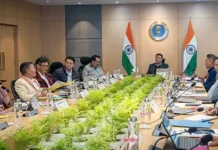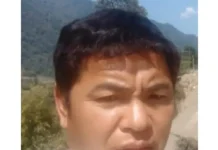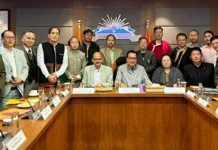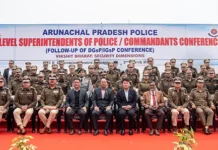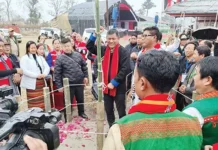[ Tongam Rina ]
It was not even 7 pm and the shops in Khonsa were all shut. The market area was pitch dark as there was hardly any streetlight. The only shop open was a medical store, but the workers were gearing up to down its shutter.
There were a few police and security personnel, all with their faces covered, guns slung over their shoulders. Some were on vehicles with their guns pointed.
Khonsa seemed under seize by silence and security personnel with guns.
When we stopped at the market for a while, I saw a police guy approaching our car. I searched for my identity card in my wallet, but realized that I had forgotten to carry it. Thankfully, the policeman just visually scanned the car and turned back.
Suddenly, I missed the loud, polluted and concrete Itanagar.
I have been to Khonsa many times, but this time the eerie silence was just overwhelming. I did not meet anyone in Khonsa who was not in tears and was not shaken by the massacre of 21 May that claimed 11 lives, including that of MLA Tirong Aboh.
“We can’t even express our fears,” said a man when I asked him if I could quote him for a report I was making.
“Every time someone has spoken up, they had to pay a price,” he said, listing a number of people who either lost their lives or were tortured.
What happens next?
It’s been 22 days, and yet there has been no breakthrough in the investigation which has been taken up by the state police and the NIA. It is a given that an investigation of this proportion will take time.
The fact that there was not enough security and security advisory for Tirong Aboh is something that the home department has to accept and respond to.
Four security personnel were just not enough for a person who was under threat and who repeatedly sought security even during his public speeches.
That there was not enough security advisory is blatant from the fact that the cars in which the 11 were massacred were travelling too close together.
The last car, some 30 metres behind the convoy, seemed to have a made an attempt to turn back before it was fired on and it caught fire. The car, which was being driven by Tirong Aboh’s nephew, was reportedly carrying firecrackers meant for the election result celebrations on 23 May.
The Tirap massacre is a lesson for the security forces and the state police that there needs to be more coordination and intelligence sharing, internal politics aside.
Why was the police force withdrawn from the district just after the elections during which violence had already claimed a life and many were tortured and abducted by various factions of the NSCN – notably the NSCN (IM) – that were literally dictating who to vote for?
Why would the DGP of the state, who is in charge of the safety and security of the people, say that the police are not to be entirely blamed for the intelligence failure?
Who was to blame – the people of Tirap who have repeatedly been failed by the state and its people? Why was the international border not sealed after the massacre? Did the security forces act after the state police had apparently told them that those responsible for the killing were sighted in a village, three days after the massacre?
The security forces did not respond to that particular question when I asked.
Understandably, the powerless DGP refused to talk.
It was not only the state police that refused to share any information regarding the lack of search operation and the failure in intelligence sharing; even the security forces refused to share any. The questionnaire sent to them remains unanswered.
But they did a good job of covering up. In the morning, when I asked them whether the security forces had winded up their search operation, they admitted that they had concluded the operation without any result or arrests. Late at night, they retracted, sending a press statement saying that they had intensified the operation to search for the terrorists.
Such flip-flops by government agencies are not new, but it’s an admission that not enough is being done. The failure of the state to provide security to its own people is just so stark, visible and heartbreaking.
I remember the person who told me that one should not be too hopeful of an outcome.
“Maybe some people from Tirap will be caught for the massacre, but the main people will escape because they are the same people the central government has reached a deal with,” the person, who lost a beloved friend, told me.
People in Tirap live in fear because they are caught between atrocities by the security forces and the NSCN terrorists and the silence of the state government. What have this state and the security forces done to secure the lives of the people in Tirap? Nothing, really, apart from denying that there is taxation by underground elements, and that the state should not be blamed for intelligence failure.
Each day, the citizens of Tirap fight their own battles to stay alive.

